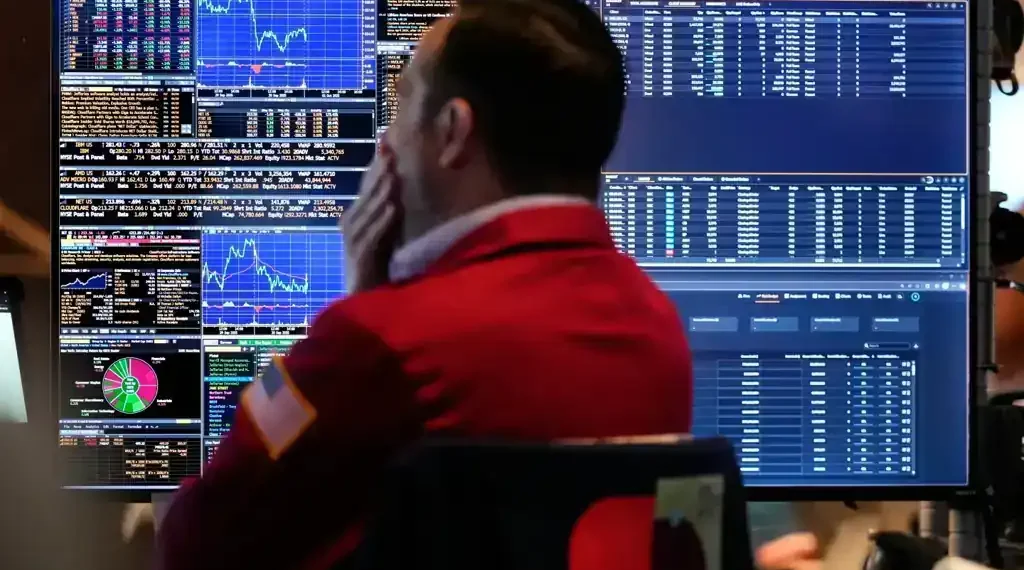Wall Street Plunges as Trump Threatens Major Tariff Hike on China
Published: October 12, 2025, 23:40 EDT
U.S. markets endured their sharpest decline in months on Friday after former President Donald Trump signaled the possibility of sharply increasing tariffs on Chinese imports. The remarks, delivered via social media, rattled global investors and reignited fears of renewed trade conflict between the world’s two largest economies.
Stocks Slide as Tariff Fears Grip Investors
Wall Street’s months of relative calm came to an abrupt halt when Trump wrote on his Truth Social platform that he was considering a “massive increase of tariffs” on goods from China. His statement, criticizing Beijing’s export restrictions on critical rare earth materials, sent shockwaves through financial markets already viewed as overvalued.
The S&P 500 fell 2.7%, marking its worst single-day performance since April. The Dow Jones Industrial Average dropped 878 points, or 1.9%, while the Nasdaq composite tumbled 3.6%.
Before the remarks, markets had been trending toward modest gains. The sudden shift reflected renewed investor anxiety about trade disruptions that could hamper corporate earnings and global economic growth.
Trade Tensions Reignite Between Washington and Beijing
Trump’s comments appeared to be in response to China’s recent curbs on exports of rare earth elements — materials crucial for producing semiconductors, smartphones, and aircraft engines. “We have been contacted by other countries who are extremely angry at this great trade hostility,” Trump wrote. He added that he saw “no reason” to meet with Chinese President Xi Jinping, despite earlier plans to hold talks during an upcoming trip to South Korea.
The renewed friction between the United States and China quickly rippled through global markets. Roughly six out of every seven stocks within the S&P 500 closed lower, including major technology firms such as Nvidia and Apple, as well as smaller industrial and consumer companies sensitive to tariffs.
Market Valuations Face Scrutiny Amid Rising Risks
Even before Friday’s sell-off, many analysts had warned that U.S. stocks were trading at stretched valuations following a near-continuous 35% rally in the S&P 500 since April. Critics argued that corporate profits had not grown fast enough to justify the market’s pace of gains.
The decline intensified concerns about speculative behavior in the artificial intelligence sector, where some analysts see parallels with the dot-com bubble of the early 2000s. “For prices to look reasonable again, either earnings must rise or prices must fall,” said one market strategist.
Corporate Spotlight: Levi Strauss Hit Hard Despite Strong Earnings
Among individual stocks, Levi Strauss & Co. saw one of the day’s steepest losses, plunging 12.6%. The jeans manufacturer reported better-than-expected quarterly profits but failed to meet investors’ heightened expectations after a 42% surge earlier in the year.
Market analysts suggested that the stock’s decline reflected a broader reassessment of retail valuations rather than company-specific weakness.
Energy Prices Fall as Mideast Ceasefire Lowers Risk Premium
Oil markets also turned sharply lower. Benchmark U.S. crude dropped 4.2% to $58.90 per barrel, while Brent crude, the international standard, slid 3.8% to $62.73.
The declines followed news of a ceasefire between Israel and Hamas in Gaza, easing concerns about potential disruptions to Middle Eastern oil supplies. Analysts said Trump’s tariff threat further fueled selling pressure, as expectations rose that slower trade could dampen fuel demand.
Bond Yields Fall as Investors Seek Safety
In the bond market, the yield on the 10-year U.S. Treasury slipped to 4.05% from 4.14% the previous day, reflecting increased demand for safe-haven assets.
Yields had already been declining before Trump’s remarks, partly due to a University of Michigan consumer sentiment report showing that Americans remain pessimistic about inflation and employment prospects.
“Pocketbook issues like high prices and weakening job prospects remain at the forefront of consumers’ minds,” said Joanne Hsu, director of the university’s Surveys of Consumers. The survey also found that short-term inflation expectations edged slightly lower to 4.6%, down from 4.7% in the previous month — a small but potentially encouraging sign for the Federal Reserve.
Fed Balances Rate Cuts Against Inflation Pressure
The Federal Reserve cut its benchmark interest rate last month for the first time this year, aiming to bolster the economy amid slowing job growth. Policymakers have hinted at additional rate cuts through next year, but Fed Chair Jerome Powell has emphasized that the central bank remains vigilant about inflation risks.
Lower interest rates can stimulate spending but also risk fueling higher prices. Economists say the Fed’s challenge will be maintaining growth without reigniting inflation that erodes household purchasing power.
Global Markets Mirror Wall Street Decline
The sell-off extended overseas, with major indexes across Europe and Asia closing lower. Hong Kong’s Hang Seng fell 1.7%, France’s CAC 40 dropped 1.5%, while South Korea’s Kospi rose 1.7% after reopening from a holiday closure.
Analysts said the global reaction underscored the extent to which U.S. trade policy remains a key driver of worldwide market sentiment.
This article was rewritten by JournosNews.com based on verified reporting from trusted sources. The content has been independently reviewed, fact-checked, and edited for accuracy, neutrality, tone, and global readability in accordance with Google News and AdSense standards.
All opinions, quotes, or statements from contributors, experts, or sourced organizations do not necessarily reflect the views of JournosNews.com. JournosNews.com maintains full editorial independence from any external funders, sponsors, or organizations.
Stay informed with JournosNews.com — your trusted source for verified global reporting and in-depth analysis. Follow us on Google News, BlueSky, and X for real-time updates.














